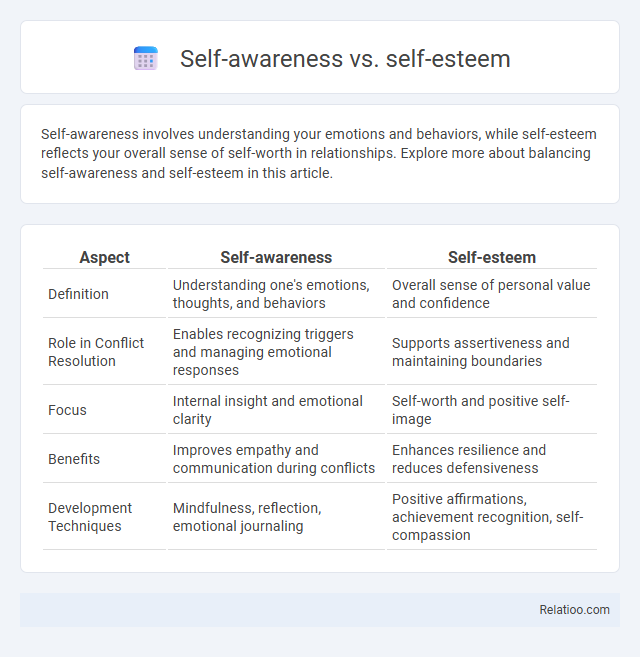Self-awareness involves understanding your emotions and behaviors, while self-esteem reflects your overall sense of self-worth in relationships. Explore more about balancing self-awareness and self-esteem in this article.
Table of Comparison
| Aspect | Self-awareness | Self-esteem |
|---|---|---|
| Definition | Understanding one's emotions, thoughts, and behaviors | Overall sense of personal value and confidence |
| Role in Conflict Resolution | Enables recognizing triggers and managing emotional responses | Supports assertiveness and maintaining boundaries |
| Focus | Internal insight and emotional clarity | Self-worth and positive self-image |
| Benefits | Improves empathy and communication during conflicts | Enhances resilience and reduces defensiveness |
| Development Techniques | Mindfulness, reflection, emotional journaling | Positive affirmations, achievement recognition, self-compassion |
Understanding Self-Awareness: Definition and Importance
Self-awareness involves recognizing and understanding one's thoughts, emotions, and behaviors, enabling better emotional regulation and decision-making. It forms the foundation for personal growth by providing clarity on strengths and weaknesses, which directly influences self-esteem--the overall value one places on oneself. Developing self-awareness enhances interpersonal relationships and professional success by fostering empathy and authentic self-expression.
What Is Self-Esteem? Core Concepts and Benefits
Self-esteem refers to an individual's overall subjective evaluation of their own worth and abilities, encompassing confidence, self-respect, and a positive self-image. High self-esteem contributes to emotional resilience, better decision-making, and healthier relationships, fostering personal growth and well-being. Core benefits include increased motivation, reduced anxiety, and enhanced capacity to cope with stress and setbacks.
Key Differences Between Self-Awareness and Self-Esteem
Self-awareness involves understanding your own emotions, thoughts, and behaviors, while self-esteem reflects how much value you place on yourself based on this awareness. Self-awareness is a conscious knowledge of your internal state, enabling personal growth, whereas self-esteem is an evaluative judgment influenced by your perceived strengths and weaknesses. Your ability to develop self-awareness directly impacts the foundation of your self-esteem by shaping how you perceive and accept yourself.
The Role of Self-Awareness in Personal Growth
Self-awareness serves as the foundation for personal growth by enabling individuals to recognize their strengths, weaknesses, and emotional triggers. Unlike self-esteem, which reflects the value one places on oneself, self-awareness provides insight into behaviors and thought patterns that influence decision-making and relationships. Cultivating self-awareness fosters emotional intelligence and adaptability, essential components for continuous self-improvement and achieving long-term goals.
How Self-Esteem Shapes Our Daily Lives
Self-esteem profoundly influences your decisions, relationships, and emotional resilience by shaping how you value yourself and your abilities. High self-esteem fosters confidence, motivating you to pursue goals and handle challenges with a positive mindset, while low self-esteem can lead to self-doubt and hesitation. Understanding the distinction between self-awareness, which is recognizing your emotions and traits, and self-esteem, which is evaluating your worth, helps you cultivate healthier interactions and personal growth.
Building Self-Awareness: Practical Techniques
Building self-awareness involves recognizing personal thoughts, emotions, and behaviors to enhance emotional intelligence and decision-making. Practical techniques include mindfulness meditation, journaling reflective experiences, and seeking constructive feedback from trusted sources. Consistent practice of these methods improves self-insight, fostering personal growth and resilience.
Strategies to Enhance Healthy Self-Esteem
Understanding the difference between self-awareness, self-esteem, and self-confidence is essential for personal growth; self-awareness involves recognizing your thoughts and emotions, self-esteem reflects your overall sense of self-worth, and self-confidence relates to your belief in your abilities. To enhance healthy self-esteem, you can practice positive self-talk, set realistic goals, and embrace self-compassion during challenges. Your commitment to these strategies fosters a resilient mindset that supports emotional well-being and personal development.
The Connection Between Self-Awareness and Self-Esteem
Self-awareness involves recognizing and understanding one's thoughts, emotions, and behaviors, which lays the foundation for developing healthy self-esteem. High self-awareness allows individuals to accurately assess their strengths and weaknesses, promoting realistic self-esteem grounded in genuine self-knowledge. The connection between self-awareness and self-esteem is vital because enhanced self-awareness fosters self-acceptance and confidence, ultimately improving overall mental well-being.
Common Misconceptions About Self-Awareness vs Self-Esteem
Self-awareness involves recognizing your own emotions and thoughts, while self-esteem is your overall sense of self-worth; many mistakenly believe high self-awareness automatically leads to high self-esteem. You can be highly self-aware yet struggle with low self-esteem due to negative self-judgments. Understanding this distinction is crucial for personal growth and emotional balance.
Developing a Balanced Sense of Self for Greater Well-being
Developing a balanced sense of self involves nurturing self-awareness, self-esteem, and self-compassion in harmony to foster greater well-being. Self-awareness enables accurate recognition of emotions and thoughts, self-esteem provides confidence in one's value, and self-compassion offers kindness during setbacks. Integrating these elements promotes emotional resilience, healthier relationships, and sustained mental health.

Infographic: Self-awareness vs Self-esteem
 relatioo.com
relatioo.com